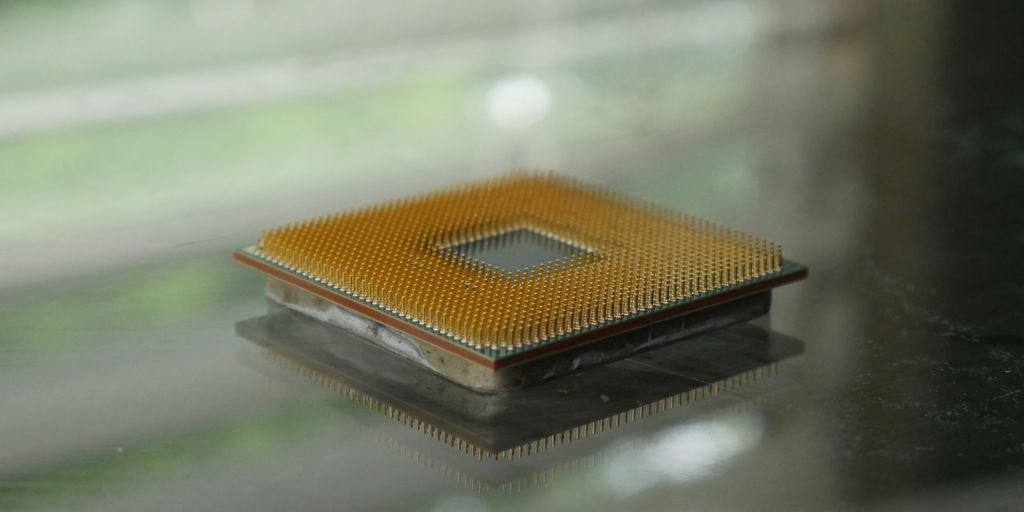So, you’re looking to build a new computer or maybe just upgrade your current one, and you’re wondering about AMD processors. Good call. In 2025, AMD has some really strong contenders, especially with their new Zen 5 chips. It can be a bit confusing trying to figure out which one is right for you, with all the different models and specs. But don’t worry, I’ve broken down the top AMD processors available this year, looking at what makes them good for different things, like gaming, work, or just everyday use. We’ll also touch on some older models that still offer good bang for your buck. Let’s get into it and figure out which AMD processor is your best bet.
Key Takeaways
- AMD’s Zen 5 architecture brings big performance gains and better power use.
- The AMD Ryzen 9 9950X3D and Ryzen 9 9900X3D are top picks for serious gamers.
- For creative work and heavy tasks, the AMD Ryzen 9 9950X is a really strong option.
- Mid-range chips like the AMD Ryzen 7 9700X offer a good mix of power and price for most users.
- The AM5 socket will be supported for a while, meaning future upgrades should be easy.
Top Tier AMD Processors for 2025
AMD Ryzen 9 9950X3D
The Ryzen 9 9950X3D is shaping up to be a beast. It combines AMD’s Zen 5 architecture with their second-generation 3D V-Cache technology. This means it’s not just fast, it’s efficiently fast. Gamers, content creators, and anyone needing serious processing power should take note. The extra cache memory gives a real edge in games that rely on quick memory access. For streamers, the 12-core design handles multiple tasks without a hitch. It requires adequate cooling solutions and the AM5 platform might need motherboard upgrades for existing users.
AMD Ryzen 9 9900X3D
This CPU is also a top contender. It’s designed for advanced data processing, which is key as AI applications become more common. The 9900X3D is expected to deliver excellent performance in both gaming and professional applications. It’s a solid choice for anyone looking to future-proof their system. AMD has committed to supporting the AM5 socket until at least 2027, making Zen 5 CPUs an investment with an upgrade path in mind.
AMD Ryzen 9 9950X
The Ryzen 9 9950X is another flagship processor in AMD’s lineup. It boasts 16 cores and 32 threads, making it a powerhouse for demanding tasks. It’s built for those who need the absolute best performance, regardless of the cost.
Here’s a quick comparison of the top-tier processors:
| Processor | Cores/Threads | Key Features |
|---|---|---|
| Ryzen 9 9950X3D | 12/24 | 3D V-Cache, High Gaming Performance |
| Ryzen 9 9900X3D | 12/24 | Optimized for AI, Excellent Multitasking |
| Ryzen 9 9950X | 16/32 | Maximum Core Count, Top-Tier Productivity |
These processors represent the pinnacle of AMD’s offerings for 2025. They’re designed to handle the most demanding workloads and provide the best possible performance for gamers and content creators alike.
Mid-Range AMD Processors for Balanced Performance
For those seeking a sweet spot between price and performance, AMD’s mid-range offerings in 2025 are looking pretty solid. These CPUs are designed to handle gaming, productivity, and even some content creation without costing a fortune. Let’s take a look at what you can expect.
AMD Ryzen 7 9800X3D
The Ryzen 7 9800X3D is shaping up to be a real contender. It’s likely to offer a generous helping of AMD’s 3D V-Cache technology, which can significantly boost gaming performance. This CPU should be a great choice for gamers who want high frame rates without needing to spend top dollar. It’s also expected to handle everyday tasks and even some moderate content creation without breaking a sweat. If you’re looking for a CPU that can do it all, this might be the one.
AMD Ryzen 7 9700X
Stepping down a notch, the Ryzen 7 9700X is aimed at users who want a solid all-around performer. While it might not have the 3D V-Cache of its bigger brother, it should still offer plenty of processing power for gaming and productivity. Expect a good core count and clock speeds that can handle most tasks with ease. This CPU is likely to be a popular choice for those building a new PC on a budget. The best CPU for you depends on your needs.
AMD Ryzen 5 9600X
The Ryzen 5 9600X is the entry-level option in this mid-range lineup. Don’t let that fool you, though – it’s still expected to be a capable performer. This CPU should be ideal for gamers on a tighter budget, as well as those who primarily use their PCs for everyday tasks like browsing the web, watching videos, and working on documents. It might not be the fastest CPU on the block, but it should offer a good balance of performance and affordability. The AMD Ryzen 5 5500 delivers exceptional value.
Here’s a quick comparison of the expected specs:
| Processor | Cores/Threads | Base Clock (Expected) | Boost Clock (Expected) |
|---|---|---|---|
| Ryzen 7 9800X3D | 8/16 | 4.0 GHz | 5.2 GHz |
| Ryzen 7 9700X | 8/16 | 3.8 GHz | 5.0 GHz |
| Ryzen 5 9600X | 6/12 | 3.6 GHz | 4.8 GHz |
When choosing a mid-range AMD processor, consider these factors:
- Gaming: If gaming is your primary focus, the Ryzen 7 9800X3D with its 3D V-Cache is likely the best choice.
- Productivity: For tasks like video editing or content creation, the Ryzen 7 9700X might be a better fit due to its higher core count.
- Budget: If you’re on a tight budget, the Ryzen 5 9600X offers a good balance of performance and affordability.
Understanding AMD Zen 5 Architecture
Alright, let’s talk about the brains behind the operation – the Zen 5 architecture. It’s not just a minor tweak; it’s a whole new way of doing things, and it’s got some serious implications for performance and efficiency. I’ve been following the leaks and announcements, and I’m pretty stoked about what AMD is bringing to the table. It’s a big deal for anyone looking to upgrade or build a new rig in 2025.
Key Innovations in Zen 5
So, what makes Zen 5 tick? Well, a few things stand out. First off, AMD is promising a significant boost in IPC (Instructions Per Cycle). That means the processor can do more work per clock cycle, which translates to faster performance across the board. They’re also packing in more AI smarts, which is becoming increasingly important for modern applications. Here’s a quick rundown:
- Improved IPC: Expect a 10-15% jump over Zen 4.
- AI Acceleration: Enhanced support for AVX-512 instructions.
- New Process Node: Moving to TSMC’s 4nm (and potentially 3nm) process for better efficiency. This could affect the most expensive laptops too, as they require efficient processors.
Performance Gains Over Previous Generations
Okay, so how does this translate to real-world performance? From what I’ve gathered, we’re looking at some pretty impressive gains. Single-threaded performance should see a nice bump, but multi-threaded workloads are where Zen 5 really shines. Think faster video editing, smoother gaming, and snappier application performance. Here’s a quick comparison:
| Metric | Zen 4 | Zen 5 (Projected) |
|---|---|---|
| Single-Threaded IPC | Base | +10-15% |
| Multi-Threaded | Base | +20-25% |
Future-Proofing with Zen 5
One of the biggest things I look for in new hardware is how well it will hold up over time. With Zen 5, AMD is setting the stage for the future. The architecture is designed to handle the demands of emerging technologies like AI and machine learning, and the move to a smaller process node means better power efficiency and thermal performance. Plus, with continued AM5 socket support, you’re not locked into upgrading your entire platform every year. It’s a smart move that gives consumers more flexibility and value in the long run. AMD’s commitment to platform longevity is a big win for consumers.
Choosing the Right AMD Processor for Your Needs
Picking the right processor can feel like a big deal, but it doesn’t have to be! It really boils down to what you plan on doing with your computer. Are you a hardcore gamer? A video editor? Or just someone who needs a reliable machine for everyday tasks? Let’s break it down.
Optimized for Gaming Performance
For gamers, single-core performance and high clock speeds are king. The Ryzen 7 9800X3D top gaming CPU is a beast, but other options might suit your budget better. Consider what resolution you play at. If you’re rocking a 1080p monitor, you might not need the absolute top-of-the-line CPU. But if you’re on a 4K display, every bit of processing power counts. Also, think about the types of games you play. Some games are more CPU-intensive than others. Here’s a quick guide:
- Esports Titles (CS:GO, Valorant, League of Legends): High refresh rate is key. Prioritize CPUs with excellent single-core performance.
- AAA Games (Cyberpunk 2077, Assassin’s Creed): Balanced CPU and GPU are needed. Look for CPUs with a good number of cores and high clock speeds.
- Simulation Games (Cities: Skylines, Microsoft Flight Simulator): These games can be very CPU-intensive, especially with lots of mods. Consider a CPU with a high core count.
Ideal for Content Creation and Productivity
Content creation is a different beast altogether. Video editing, 3D rendering, and other creative tasks benefit massively from having more cores and threads. The Ryzen 9 series is generally the way to go here, but even a Ryzen 7 can be a solid choice depending on your workload. Here’s a breakdown:
- Video Editing: More cores mean faster rendering times. Consider a Ryzen 9 for professional work, or a Ryzen 7 for hobbyists.
- 3D Rendering: Similar to video editing, core count is crucial. Also, make sure your CPU supports the instruction sets used by your rendering software.
- Software Development: A fast CPU can speed up compilation times. Consider a CPU with good single-core and multi-core performance.
Mainstream and Budget-Friendly Options
Not everyone needs a super-powered CPU. For everyday tasks like browsing the web, writing documents, and watching videos, a more budget-friendly option will do just fine. The Ryzen 5 series offers a great balance of performance and price. You can still get a snappy experience without breaking the bank. Plus, you can always upgrade later if you need more power. Don’t underestimate the CPU power you need. Here’s a quick look at some budget-friendly considerations:
- Everyday Computing: Ryzen 3 or Ryzen 5 are perfect for basic tasks.
- Light Gaming: A Ryzen 5 with integrated graphics can handle some games at lower settings.
- Office Work: A Ryzen 5 provides plenty of power for spreadsheets, presentations, and other office applications.
Power Efficiency and Cooling Requirements
Alright, let’s talk about keeping these processors cool and not bankrupting ourselves with the electric bill. It’s a balancing act, especially with the high-end chips. You want that blazing fast performance, but you also don’t want your PC sounding like a jet engine or melting down.
Cooling Solutions for Flagship Models
Those top-tier Ryzen 9s, especially the X3D variants, they run HOT. Seriously, don’t even think about slapping a stock cooler on them. AMD pretty much recommends liquid cooling for the 9950X and 9950X3D, and honestly, they’re not wrong. A high-end air cooler might work, but you’ll be pushing it, and you’ll probably see some thermal throttling under heavy loads. Think of it this way: you’re buying a Ferrari, you don’t put cheap tires on it, right? Same principle here. Get a good AIO (All-in-One) liquid cooler, or even a custom loop if you’re feeling fancy. It’s an investment, but it’s worth it to keep your expensive CPU running at its best.
Energy Efficiency of Zen 5 Processors
Now, the good news is that Zen 5 is generally more energy-efficient than previous generations. AMD has been making strides in this area, and it shows. The lower TDP (Thermal Design Power) of some of the mid-range chips means you don’t need a massive power supply or an elaborate cooling setup. The AMD surpassed its 30×25 energy efficiency goal, which is great news for everyone. But even with the improvements, you still need to pay attention to your PSU wattage and make sure you’re not overloading it. A good rule of thumb is to add up the TDP of all your components (CPU, GPU, etc.) and then add at least 20% headroom.
Optimized Core Scheduling
One of the cool things about Zen 5 is how it handles core scheduling. The architecture is designed to intelligently distribute workloads across the cores, which helps to improve both performance and efficiency. This means that the CPU can dynamically adjust the clock speeds and voltage of individual cores based on the workload, which can help to reduce power consumption and heat output. It’s not magic, but it’s a pretty clever way to get the most out of the hardware. Basically, the CPU is smart enough to know when to crank up the power and when to dial it back, which is good for both performance and your electric bill. Here’s a quick table showing the typical power consumption you might expect:
| Processor | Typical Power Consumption (Gaming) | Typical Power Consumption (Idle) |
|---|---|---|
| Ryzen 9 9950X3D | 150-180W | 40-50W |
| Ryzen 7 9700X | 100-130W | 30-40W |
| Ryzen 5 9600X | 80-110W | 20-30W |
Keep in mind these are just estimates, and your actual power consumption will vary depending on your specific system configuration and workload.
AMD’s Commitment to Platform Longevity
AMD has been making waves not just with raw processing power, but also with their dedication to supporting their platforms for the long haul. It’s not just about buying a CPU today; it’s about knowing you can upgrade later without having to replace everything. AMD’s commitment to the AM5 socket is a big part of this.
AM5 Socket Support Through 2027
AMD has promised to support the AM5 socket until at least 2027. What does this mean for you? It means that if you invest in an AM5 motherboard now, you’ll likely be able to upgrade to newer generations of Ryzen CPUs without needing a new motherboard. This saves money and reduces e-waste. It’s a huge advantage over other platforms that often require a new motherboard with each CPU generation. This commitment to AM5 socket longevity is a big win for consumers.
DDR5 Memory and PCIe 5.0 Integration
Zen 5 processors fully embrace the latest technologies, including DDR5 memory and PCIe 5.0. DDR5 offers faster speeds and higher bandwidth compared to DDR4, improving overall system performance. PCIe 5.0 doubles the bandwidth of PCIe 4.0, which is great for next-gen GPUs and super-fast SSDs. These technologies ensure that your system is not only fast today but also ready for future advancements. The 9800X3D is a solid investment that should remain competitive for years to come.
Readiness for AI-Focused Applications
AMD is also looking ahead to the future of computing, with Zen 5 processors designed with AI-focused applications in mind. As AI workloads become more common, having a processor optimized for these tasks will be increasingly important. This future-proofing ensures that your investment in a Zen 5 CPU will continue to pay off as AI technology evolves. AMD’s latest powerhouse represents a significant leap forward in desktop processing.
Value Proposition of Older Generation AMD CPUs
It’s easy to get caught up in the hype surrounding the newest CPUs, but let’s not forget about the value that older generation AMD processors still bring to the table in 2025. While they might not boast the cutting-edge performance of Zen 5, they can be a fantastic option for budget-conscious builders or those looking to upgrade without breaking the bank. These CPUs offer a compelling balance of performance and cost, making them relevant for specific use cases.
AMD Ryzen 5 5500 for Budget Builds
The AMD Ryzen 5 5500 is a prime example of a CPU that continues to deliver excellent value. It’s perfect for budget-oriented gaming rigs or everyday computing tasks. You get a solid level of performance without emptying your wallet. It’s an unlocked CPU, meaning you can overclock it to squeeze out even more performance. Plus, it often comes with a decent stock cooler, saving you even more money. Sure, it might not be the fastest, but for the price, it’s hard to beat.
Continued Relevance in 2025
Even as newer CPUs dominate the headlines, older AMD processors maintain their relevance for several reasons. First, many games and applications don’t fully utilize the capabilities of the latest high-end CPUs, meaning you might not see a significant performance difference in real-world scenarios. Second, the AM4 platform, which supports many of these older CPUs, is mature and affordable. Motherboards and other components are readily available and often cheaper than their AM5 counterparts. Finally, for tasks like web browsing, office work, and light gaming, an older Ryzen CPU is more than capable.
Balancing Performance and Cost
Ultimately, choosing an older generation AMD CPU is about finding the right balance between performance and cost. If you’re building a high-end gaming PC or workstation, the latest Zen 5 processors are the way to go. However, if you’re on a tight budget or only need a CPU for basic tasks, an older Ryzen CPU can save you a significant amount of money without sacrificing too much performance. It’s all about understanding your needs and making an informed decision. You can still get a [top CPUs] for your needs.
Conclusion
So, that’s the rundown on AMD’s processors for 2025. It’s pretty clear they’ve got a lot of good stuff going on, whether you’re into serious gaming or just need a solid computer for everyday tasks. Picking the right one really just comes down to what you’re going to use it for and how much you want to spend. There’s a chip for just about everyone, which is nice. Hopefully, this helps you figure out what’s best for your setup.
Frequently Asked Questions
Which AMD processor is best for gaming in 2025?
The best AMD processor for gaming in 2025 is the AMD Ryzen 9 9950X3D. It has special tech called 3D V-Cache that helps games run super fast, giving you more frames per second.
What is AMD Zen 5 architecture?
Zen 5 is AMD’s newest processor design. It makes chips faster and use less power. This means your computer can do more things at once, like play games and run big programs, without getting too hot.
Are Zen 5 processors good for future computer upgrades?
Yes, Zen 5 processors are a good choice for the future. They use new tech like PCIe 5.0 and DDR5 memory, and AMD plans to support the AM5 socket until at least 2027. This means you can upgrade parts of your computer later without needing a whole new system.
Which AMD processor is best for creative work?
For creative work like editing videos or making 3D models, the AMD Ryzen 9 9950X or Ryzen 9 9900X are great. They have many cores and threads, which helps them handle tough tasks quickly.
Do I need special cooling for Zen 5 processors?
High-end Zen 5 processors, especially the X3D models, need good cooling, like liquid cooling, to work their best. Mid-range chips, like the 9700X, can often use a good air cooler.
Are older AMD CPUs still worth buying in 2025?
Older AMD CPUs like the Ryzen 5 5500 are still good for people on a budget. They offer good performance for gaming and everyday tasks without costing a lot, making them a smart choice if you want to save money.












